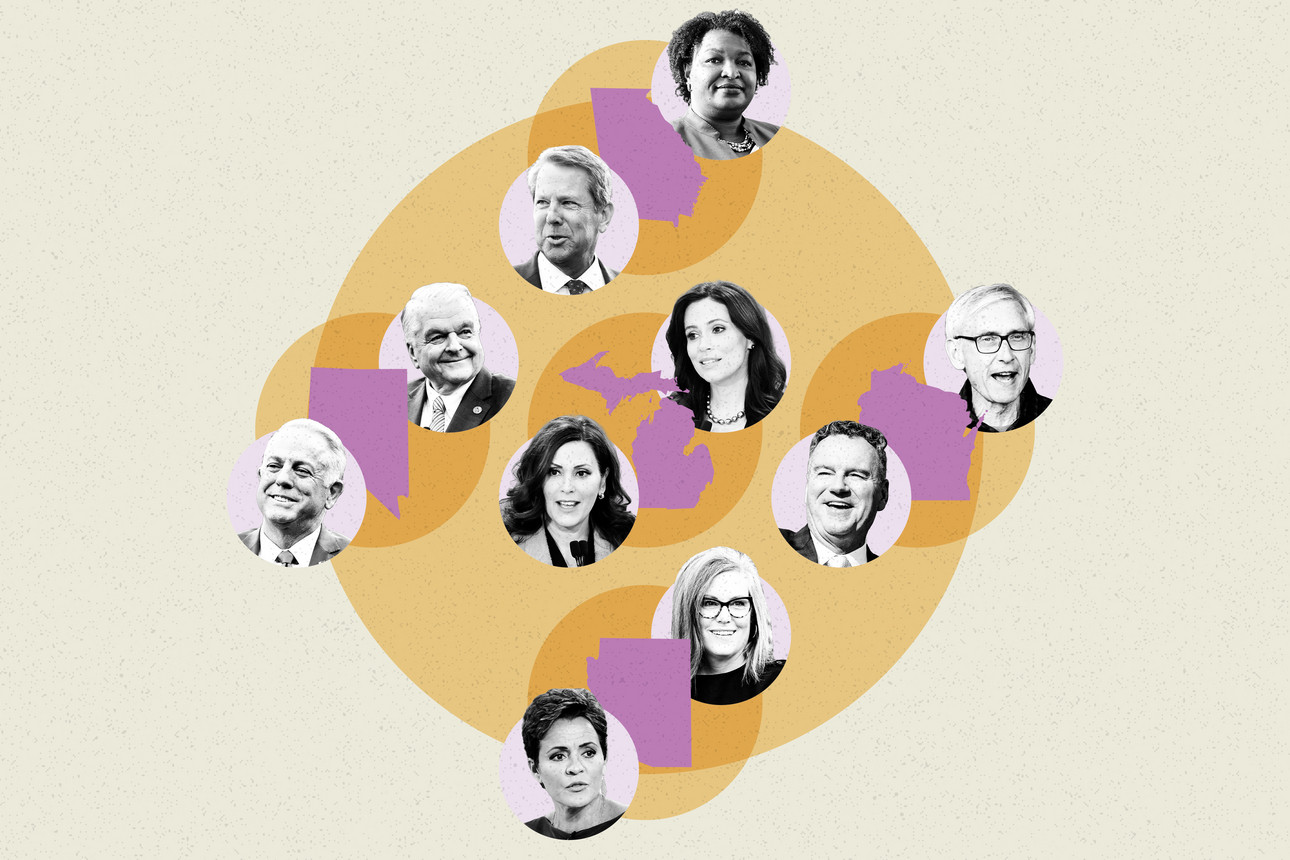Governor races are often idiosyncratic contests that defy national trends. But even by that standard, this election has been a highly unusual one.
The election cycle started largely focused on Democratic incumbents on defense in traditional battleground states — like Michigan, Nevada and Wisconsin — or open seat battles in places like Arizona and Pennsylvania. And while almost all of those states still remain on the board, the map has expanded significantly to include bluer states like Oregon and New Mexico, as well as sleeper contests like deep-red Oklahoma.
It is partially a story of resilience for Democratic incumbents. While many are still locked in very close contests that they could lose on Tuesday, Democratic governors have broadly not been knocked out of contention by an unfavorable national political environment — though they could all get swept away if the election results are as dire for Democrats as some of the polling in federal races indicates. But Democrats believe the general strength of their incumbents gave them the ability to get to Election Day with at least a fighting chance.
That said, the overall environment provides an opening for Republicans to retake a significant number of governorships. The GOP currently has 28 governors to 22 for Democrats — but four of the five « Toss Up » governor’s races in the POLITICO Election Forecast are currently Democratic-held, and Democrats are protecting a lot more « Lean » seats too.
Here’s the landscape heading into Tuesday.
The ‘wait, that state is competitive?’ states
President Joe Biden won Oregon by 16 points in 2020, but it’s poised to have one of the closest governor races in the country. Democrats have launched a last-ditch campaign effort to boost Gov. Kathy Hochul in New York. And national Republicans have spent more money on Oklahoma’s governor’s race than Pennsylvania’s.
Oregon hasn’t elected a Republican governor since 1982, but it’s the prime example this year of how unpredictable races for governor can be.
It starts, first and foremost, with the candidacy of Betsy Johnson, a one-time Democratic lawmaker who launched a well-funded independent campaign for governor. Both parties broadly agree that she’s pulling more support from Democrats than Republicans. That’s made the race between Democrat Tina Kotek, a former state House speaker, and Republican Christine Drazan, a former state House minority leader, one of the closest in the country.
The contest has revolved around crime and homelessness in the state, along with the legacy of outgoing Democratic Gov. Kate Brown, who is one of the more unpopular chief executives in the country.
New York has been another surprise race. Democratic Gov. Kathy Hochul took over the blue state at a tumultuous time for Democrats there, replacing Andrew Cuomo atop the party.
Republican Rep. Lee Zeldin, who gave up his seat in Congress to seek higher office, and big outside spenders has been hammering Hochul on crime. She is still the favorite — and should she win, she’ll be the first woman elected governor of New York — but both parties concede the race has tightened in the closing weeks. The race has seen a wave of last-minute spending.
The last big surprise state has been Oklahoma, where Republican Gov. Kevin Stitt is in a close race with state education superintendent Joy Hofmeister, who left the GOP to run for governor as a Democrat. Stitt has been bombarded with millions of dollars of dark money spending in the state. National Republicans launched a last-minute rescue campaign — one that national Democrats did not match — and his allies insist Stitt is in good shape in the last days of the race.
South Dakota Gov. Kristi Noem is worth an honorable mention here: She is still heavily favored to win and hasn’t faced an ad barrage like Stitt, but she has called in prominent national surrogates for a boost — a reminder that she only won her first term by 3 points in 2018.
Incumbents versus environment
Operatives who work on gubernatorial races say one of the toughest things to do in politics is beat an incumbent governor. The axiom is facing a stress test this year.
Perhaps the most endangered incumbent in the country is Nevada Democratic Gov. Steve Sisolak. He is facing Clark County Sheriff Joe Lombardo in the perennial swing state. Another close race in a tightly divided state features Democratic Gov. Tony Evers against Republican businessman Tim Michels in Wisconsin, where Michels recently said Democrats won’t win an election in the state again should he win on Tuesday.
One more Democratic governor looking to defy political gravity is Kansas’ Laura Kelly. Despite running in the reddest state of any Democratic incumbent, she has kept the race close, and there’s been some public grumbling from national Republicans about how state Attorney General Derek Schmidt is running his campaign. Even so, this race is still a jump ball at best for Democrats.
Some other Democrats have fared a bit better, and are currently sitting at “lean Democratic” in POLITICO’s forecast. Headlining this group is Michigan Gov. Gretchen Whitmer, who has led in public polls all year. The polls have tightened in the state, though, and neither party backed out in the run-up to the election.
Other notable contests in this category include New Mexico, where Republicans have been bullish about their chances against Democratic Gov. Michelle Lujan Grisham, as former TV weatherman Mark Ronchetti runs a crime-focused campaign.
In Maine, two well-known figures are squaring off: Democratic Gov. Janet Mills and her immediate predecessor, Republican Paul LePage. Connecticut’s Ned Lamont and Minnesota’s Tim Walz are slightly favored as well.
The lone Republican governor in this competitive grouping is Georgia’s Brian Kemp, who faces a rematch of the 2018 election with Democrat Stacey Abrams. Kemp started the election cycle facing the fury of former President Donald Trump for not helping him overturn the 2020 election. But Kemp easily dispatched a Trump-backed primary challenge and has consistently led Abrams. In polls, he often edges above the majority mark Georgia statewide candidates must hit to avoid December runoffs.
A tale of two open seats
A pair of open seats in Pennsylvania and Arizona were expected to be among the most competitive contests this year. There are plenty of similarities between the states — they’re battlegrounds with GOP nominees who deny Biden won the 2020 election and ultra-competitive Senate races also on the statewide ticket.
But only one of these states is in play.
Democratic state Attorney General Josh Shapiro is expected to beat Republican state lawmaker Doug Mastriano by what qualifies as a healthy margin in tightly divided Pennsylvania. The race there has been a campaign in contrasts: Shapiro effectively had no primary challenger, raised boatloads of money and was up on television early and often. Mastriano, a far-right election denier, came through a messy primary with no professionalized campaign or fundraising operation to speak of, and he has received no help from national Republicans.
The same can’t be said for Republican Kari Lake in Arizona. Lake, a former TV anchor who has allied herself with Mastriano, survived a bruising primary against a more establishment figure. But Republicans in the state and nationally rallied around her in her race against Democrat Katie Hobbs. The Republican Governors Association — and its chair, outgoing Arizona Gov. Doug Ducey — both backed Lake after the primaries, and the state has been among the biggest targets for both parties.
Even some allies of Hobbs, who refused to debate Lake, have privately and publicly fretted that she ran an ineffective campaign.
Two states definitely poised to flip
It has been taken for granted, but Democrats are all but guaranteed two easy flips this year: Massachusetts and Maryland. Both states’ popular, moderate Republican governors are retiring, and the GOP nominated close allies of Trump — Geoff Diehl in Massachusetts and Dan Cox in Maryland — to be their new standard bearers.
That cleared the way for the two Democrats who would make history by winning their states. Wes Moore, a first-time candidate, military veteran and former nonprofit CEO, would be the first Black governor of Maryland and just the third elected Black governor ever. Massachusetts Attorney General Maura Healey is vying to the nation’s first lesbian governor. And there is already buzz about them being new voices for the national Democratic Party once they take office.



0 commentaires